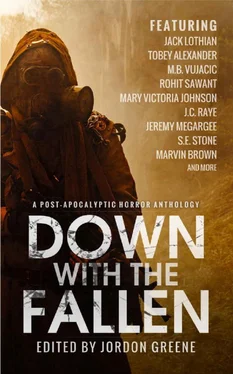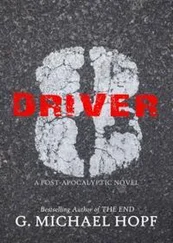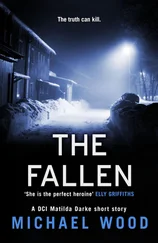“I leaned into her, our lips joining in a passionate kiss for the New Year. And even in the heat of our kiss, in my mourning of the death of virtue, I couldn’t help but laugh. She asked me what was so funny and wiping tears from the corner of my eyes, I told her, ‘Why, my dear, you’ve got something on your face!’”
Vincent Virgo’s voice trailed off into a somber laugh, as if his joke was as bitter as it was sweet.
Now smiling, the Higher continued, “I thrusted her over the balcony and watched her get swallowed by the sea of savages below. She was beautiful in her final moments, even as they ripped the flesh from her bones.”
erring shot out of his chair. His face red with fury, he flipped the steel table and lunged at the Higher. He lifted the Higher out of his seat by the collar of his shirt. On the other side of the glass, Pratt cursed under his breath. Detective Herring had lost it. It was time to intervene.
“Is this some sort of joke to you?” Herring spat. “Why did you really kill these people?”
“I told you why.”
“Oh, because you’re so self-righteous, right? You’re some sort of hero who cares for the little guys. Just why would you care about the little guys, huh, Mr. Virgo? Why would you care what people like you did to people like me?”
Struggling, Vincent separated himself from Herring’s clutches. His coolness had given way to a passion as unabridged and shameless as his adversary.
“Don’t be so blind, Detective! People like me, people like you, us, them. In the end it doesn’t matter, we’re all just people. People who hurt and hate each other not out of reason, but out of some sort of animalistic instinct. That’s what it is, Detective. Why I hated people like Oliver Watson, why I hate people like you. Because at our roots, we are no better than the diseased savages feeding on each other on the Bottom.”
“So, you have no remorse for killing, for what you did to Abigail? Because she was a savage.”
I am wiping the face of the earth of all its blemishes, so it can be beautiful again.”
Swiftly reclaiming Vincent’s collar, Herring cocked his fist back and unloaded. Repeatedly, he struck Vincent’s face, drawing blood by the second blow. He dropped to the floor by the time Pratt entered the room.
“What… what are you doing?”
Herring didn’t face his comrade. He kept his eyes on the beaten mess writhing on the ground.
“Some hands-on justice. This piece of shit is probably going to walk anyway and he knows it. So, why not? Why not just punish him now? While we have him.”
Vincent Virgo hollered from the floor, his laugh echoing through the room.
“Justice. Punishment. You sound like me, Detective, before I actually grew up and took action. Before I saw man for what he is. Come on. See me for what I am! Snuff me out from this world! Do it! Do it!”
Herring pulled his pistol and aimed it at Virgo’s face. Before Pratt could stop him, he pulled the trigger. Herring was indifferent to the splatter of scarlet on his face. It seemed almost therapeutic to him, to see that the Higher’s blood was as red as his. No more. No less.
Prat fled, as much out of fear as shock, and Herring was left alone with the body, left in silence to realize that Vincent Virgo was right all along.
In the end, through scars and masks, they were the same.
The mother—she could have been their biological mother, though in recent days, it was impossible to be sure who belonged to the real family units and which people had simply bonded together in the chaos following the invasion—clutched the youngest girl protectively against her. She and the two older girls held hands in a chain and walked in formation along the side of the highway. With so many people crowding together onto the fresh two-lane flattop, the last shiny trace of government stimulus funds, it grew increasingly more difficult to breathe. They’d walked for days, which added to the burden, and it had rained; a cloying, hot May rain that clung unpleasantly to the skin.
The family exited the shadow of an overpass that sat in pieces on the other side of the highway, the metal there showing burn marks around the places where it had liquefied to slag. The mother, holding the youngest girl’s weight on her hip and head on her shoulder, turned away from the flyblown remains visible at the edges of the rubble. The view on their side of the highway wasn’t much better. The rain had run into an area of deadfall precipitously close to the pavement. People bathed in that stagnant pool. Some, she noted, wrapping her free arm around the nearest of the two girls marching in step beside her and calling the other close, floated face down.
This was what life had become after the first vortexes formed over major cities, she thought, and the brief war was unofficially lost to a merciless enemy who’d claimed victory without so much as showing its face to the conquered.
* * *
The two girls. One was sixteen. The other wasn’t quite a teenager yet, trapped in that awkward physical state when the body has experienced a growth spurt but the face hasn’t quite caught up. The older gripped the younger by the sleeve of her brightly colored T-shirt. The youngest, cradled against the mother, slipped free and down to her feet, the mother no longer able to shoulder her weight. That girl’s face was scrunched into worry lines that might never straighten out, even if given an entire lifetime.
They marched together, one holding onto another in a line, like elephants in a circus parade.
“There’s the next exit,” somebody, a woman, said. A woman, because most of the refugees were women, the men and boys above a certain age drafted into service for a war that had, by all measures that mattered, already ended.
The highway sign pulled free of the horizon and hovered in a shade of green brighter than the lime-colored new leaves undulating at the sides of the pavement. The Bedford exit didn’t offer much in terms of hope; it wasn’t the germs that killed the sinister Martians inside their tripods or the computer virus that deactivated the shields so the jet fighters could take down the colossal alien motherships in those other, fictional invasions. Had it been days or weeks since they’d seen a jet in the sky? And that one was disintegrating high overhead, in pieces at the tip of a sonic boom.
But the Bedford exit offered a break from the walk. A place to relax and rest and, most importantly, learn the latest information from what remained of the world’s governments. At last report, the Canadians were coordinating the global response. How far down the line had things fallen so that the military in Montreal was making the key strategic decisions, the mother absently wondered.
Parched and sore in a way she’d never known, every joint feeling exposed and swollen, she cycled through the information for the umpteenth time, no longer sure what was real or the result of her frazzled imagination. Purple-black vortexes, over three hundred of them in the sky, and then… silence, darkness, on the heels of a terrible, destructive thunderclap.
Another sound, one equally terrible, jolted her out of the fog and back to the moment.
“Do not attempt to exit—keep moving! Bedford is sealed to all non-residents at this time per order of the mayor’s office and the board of selectmen. I repeat—”
The baritone bullhorn voice boomed the same announcement, this time louder. Not really louder, the mother realized. Closer. They passed underneath the green traffic sign. A cacophony of angry shouts and expletives laced the air.
“What do you mean, closed ?” somebody shrieked, swears lobbed with the question at whoever held the bullhorn.
Читать дальше












